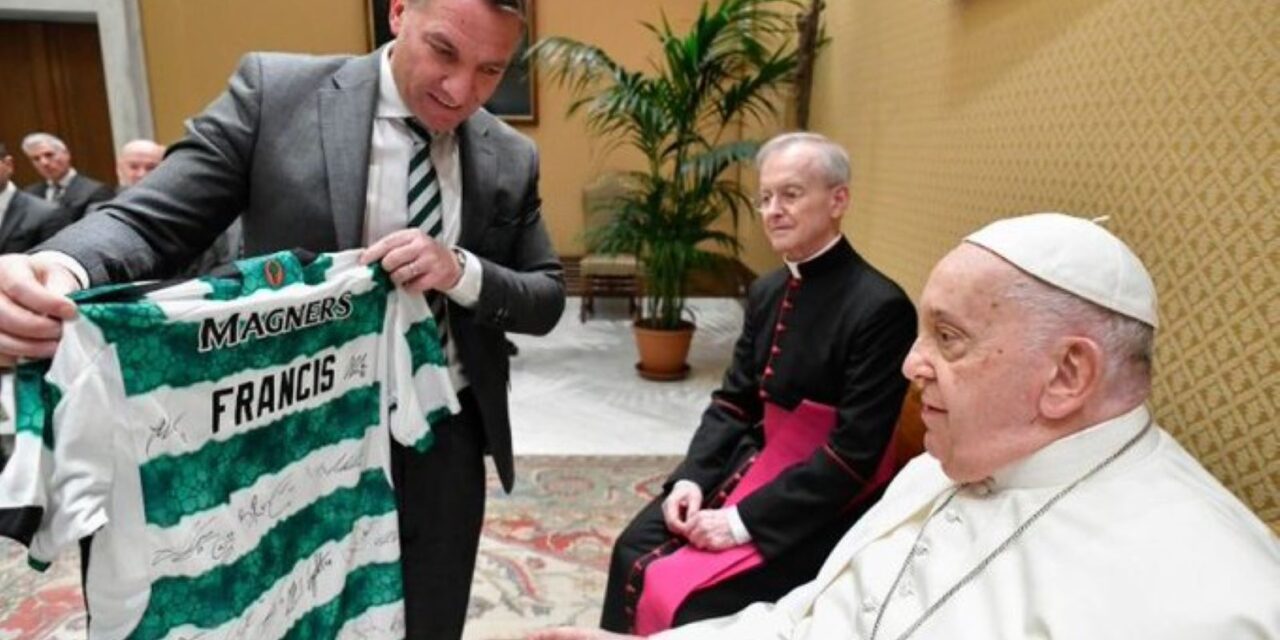A Celtic supporting acquaintance of mine once told me the story of how he was talking to a work mate in England. His friend told him he had decided to be a Chelsea fan at the age of 10, after watching them defeat Leeds in the 1970 FA cup final on TV. A good choice given the great players who Chelsea had at the time including such legends as Peter Bonetti, Peter Osgood, Charlie Cooke and Alan Hudson. He asked his colleague when, and why, he had decided to support Celtic. The reply was that it had been decided at conception that he would be a Celtic fan, because coming from a strong Glaswegian Catholic background, there was no decision to make. The English guy couldn’t understand this but of you live in the West of Scotland you will definitely get the gist of what the Celtic fan was saying.
I am always fascinated by the various reasons of why people support Celtic. I’ve met people who decided to support them because they liked the strip, that they liked the attacking football which Celtic traditionally play, or many, many other reasons which are all unique and special to each individual fan, which have absolutely nothing to do with religion, or even politics.
However, like my friend’s story, stated above, there was only one team to consider supporting for most of my Celtic supporting generation. Having been raised within the boundaries of inner city Glasgow in the 1970’s and attending a Catholic school, virtually everyone I knew supported Celtic. The teachers spoke of the results on a Monday morning, the Priest commented on the team’s affairs after Mass on a Sunday, even the old Janny at school was a Celtic fanatic.
At a time when Rangers, at that time Scotland’s most successful club, employed a sporting version of religious apartheid, it was inevitable that the vast majority of the Catholic population in and around Glasgow would throw their weight behind Celtic. These were different times. The real apartheid system was still very much alive in South Africa; the ultra-communist Soviet Union Empire was in control of vast swathes of Europe; and the Berlin Wall still stood in place to divide east from west. All things very much acceptable back then which would not be so acceptable now.
And yet the link between Celtic and West of Scotland Catholics wasn’t merely down to choosing to support a football team merely for the sake of it, because others practiced an anti-Catholic agenda. Our fathers and grandfathers spoke with great pride of the club’s humble origins in 1887-1888. They were immensely proud that Celtic was formed to feed the poor children of the east end of Glasgow, at a time when the poverty and deprivation would be indescribable, and incomprehensible, to those of us living with the home comforts of the twenty first century. As a Celtic historian once commented, the modern Celtic fan ‘couldn’t handle’ hearing descriptions and visualising how bad life was in Glasgow’s East end in the late 1880’s. Celtic were formed to feed their own, in their local community, at a time when no one else would due to religious prejudice.
Celtic were formed to help their poor, our own poor. The three parishes of St Mary’s, St Michael’s and The Sacred Heart, all still on the go at time of writing. However, the best thing Celtic’s founding fathers ever did was to open the club to all from its earliest days. Yes, the majority of supporters hailed from the Irish-Catholic diaspora, but the only thing on which you were judged at Celtic Park was on your talent. This has carried forward to the current day where Celtic fans (and players) come from all parts of the world and all walks of life. As Willie Maley famously said, it’s not the creed or the nationality that counts, it’s the man himself. It’s to Celtic’s eternal credit that they did not go down the road of being an exclusive club to one section of society and close themselves off to the rest.
Despite their Catholic identity, Celtic attracted a great number of followers from other religious persuasions, and also those of none. This was always a source of pride to my father’s generation, who having experienced religious intolerance and downright bigotry in their lives, had no desire to see Celtic involved in this in any way and, indeed, wanted Celtic to be seen to rise above it and set an example to others. That is reflected in the current Celtic support, which is massive, and continues to attract and welcome a diverse range of supporters from across the religious and political spectrum.
Much has been said and written of the Celtic party meeting with Pope Francis in Rome recently. Even as a club open to all, we should still retain a deep sense of pride in the Catholic heritage of the club’s founders, led by Brother Walfrid. Celtic was integral to the identity of Glasgow’s immigrant Catholic community during some very difficult times over a very long period. It gave them a sense of belonging and a sense of pride, which has lasted the course of time until the present day. No matter what becomes of Celtic in the decades to come, it is to be hoped that Celtic’s Catholic heritage, and the links with the Catholic parishes of the East End, will be something which will always be cherished.
How proud Brother Walfrid would have been to have seen representatives of the modest club, which he was instrumental in founding in such troubled times in 1887, meeting the Holy Father in 2023.



